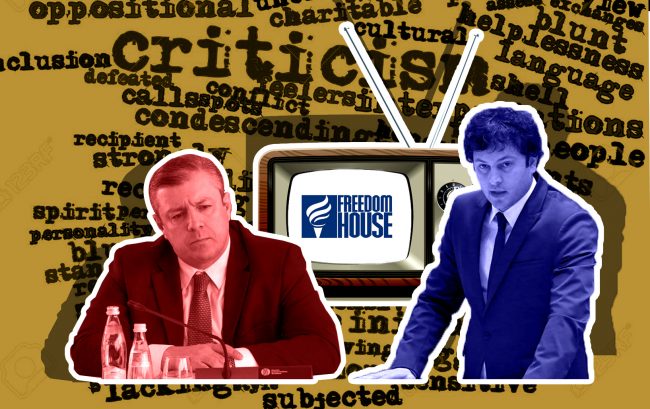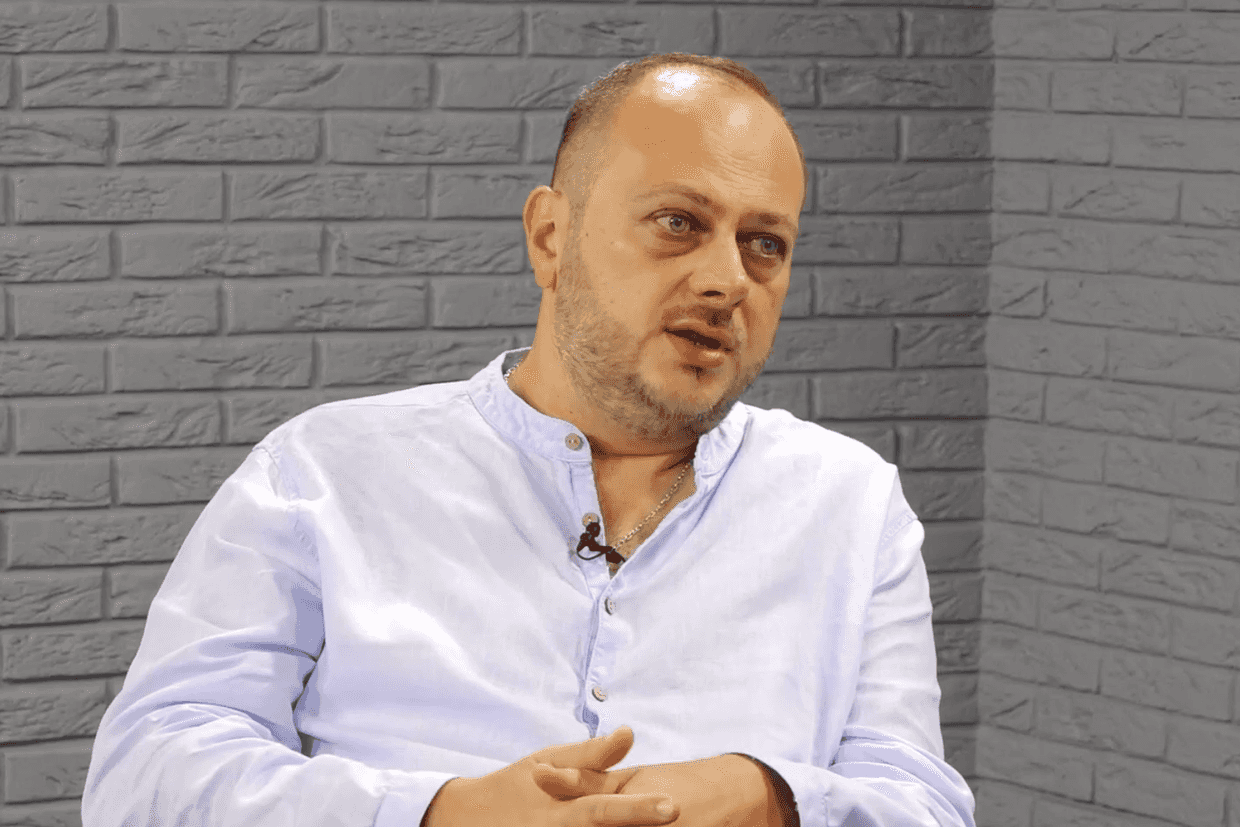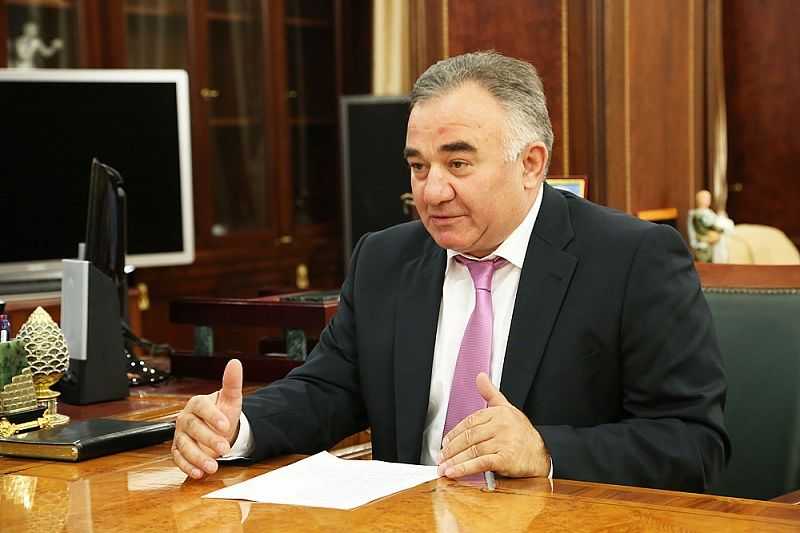

 Leaders from the ruling Georgian Dream party have criticised American rights watchdog Freedom House, for suggesting democracy declined in the country in 2017. ‘Absurd, unobjective and amusing’ were some of the words PM Giorgi Kvirikashvili and Parliament chairman Irakli Kobakhidze used to describe their 2018 Nations in Transit report, which said informal governance was ‘one of the key features of GD’s rule’.
Leaders from the ruling Georgian Dream party have criticised American rights watchdog Freedom House, for suggesting democracy declined in the country in 2017. ‘Absurd, unobjective and amusing’ were some of the words PM Giorgi Kvirikashvili and Parliament chairman Irakli Kobakhidze used to describe their 2018 Nations in Transit report, which said informal governance was ‘one of the key features of GD’s rule’.
The report said that ‘since 2012, key ministerial portfolios have been held by Ivanishvili’s associates, and neither Ivanishvili himself nor the Georgian government have made a secret of the fact that Ivanishvili has played a “consulting” role’.
The Prime Minister hit back in comments to the media on Thursday, saying that ‘assessments by Freedom House are increasingly unobjective’.
‘[The report] relies on a totally imbalanced information and I think that the Freedom House should think twice when disseminating such unobjective information and assessments regarding the quality of democratic developments in Georgia’, said Giorgi Kvirikashvili.
He said several people have served as PM since Ivanishvili held the post, ‘but the main trend is a whole different quality of democracy which has become default’.
‘Unlike the UNM, GD has rarely resorted to coercion, relying instead on various informal co-optation mechanisms that have made its image less threatening and bolstered its continuing popularity’, the report reads.
Until this year’s report, Freedom House had scored Georgia higher in terms of democracy every successive year since Georgian Dream ousted the United National Movement in parliamentary elections in 2012.
Criticism from Parliament’s Chairman, Irakli Kobakhidze, was no less intense than the PM’s. He said the authors of the report could not hide their ‘negative feelings’ towards Ivanishvili who is ‘the main creator of the democratic breakthrough’ in Georgia. Kobakhidze said the authors of the report could not specify any examples of ‘informal governance’, thus such criticism is ‘groundless’.
The Freedom House report said that ‘in 2017, a number of controversial cases added to suspicions about Ivanishvili’s influence on state authorities’, such as the controversial Panorama Tbilisi project.
[Read on OC Media: Investigation | Who are Panorama Tbilisi’s mystery backers?]
‘In October, the Tbilisi City Council transferred a 1,900-square-meter plot of land for the symbolic amount of 1 lari to a company affiliated with Ivanishvili; the deal was part of “Panorama Tbilisi,” Ivanishvili’s proposed real-estate development in the hills overlooking the capital’, the report says.
[Read on OC Media: How and why a piece of central Tbilisi was sold for ₾1]
Kobakhidze accused Freedom House of being subjectively ‘against the current government of Georgia’.
‘One of the most outstanding examples of their subjective assessments of Ivanishvili is the criticism regarding the Panorama Tbilisi project, lacking evidence’, said Kobakhidze. He said the report reiterated the image ‘Rustavi 2 and Saakashvili’s other friends’ drew, ‘portraying building as destruction’.
The report said that the ‘independent media’ rating declined from 4.00 to 4.25 [on a 1-7 scale, 7 being the worst]. It said the decline comes ‘due to apparently politicized editorial policies at Georgian Public Broadcasting, continuing pressure on the critical television channel Rustavi 2, and ownership consolidation among pro-government private television stations’.
Kobakhidze said it is ‘amusing’ how Freedom House said ‘the rating of media independence hasn’t changed compared to 2012’.
Nate Schenkkan, the Project Director for Nations in Transit told OC Media that the report speaks for itself as an assessment of developments in Georgia during 2017.
‘Freedom House and Nations in Transit approach our analytical task in a nonpartisan way, as is clear through our scores for Georgia during different governments both under the UNM and GD’, the told OC Media commenting on the criticism the report drew from Georgian Dream leaders.
The head of the Georgian Public Broadcaster, Vasil Maghlaperidze, also fired back, commenting on the assessments regarding media independence. He said that ‘not only Georgian residents but also anyone who’s ever passed by Georgia’ would not believe that media independence is the same as in the past years.
‘I won’t elaborate on the poor condition media was in, I won’t be recalling the crackdowns or satellite marches, how several channels used to broadcast the same information and so on. If somebody thinks that the same situation was present in 2017 as well, they are either unqualified or mistaken’, said Maghlaperidze.
Meanwhile, MPs from the opposition said the report and its conclusions posed a threat to the euro-atlantic integration of Georgia. Salome Samadashvili from United National Movement (UNM) told Rustavi 2 that ‘if the government cannot see the extent of the strategic threat the report poses, it confirms that they cannot understand that strategic goals the country has to pursue immediately’.
Another MP from UNM, Irakli Abesadze, said the ruling party is ‘desperately trying to shield Ivanishvili and his interests [from criticism] instead of discussing solutions to problems’.
[Read more about Freedom House 2018 report on OC Media: Freedom House: Democracy declines across the Caucasus]









